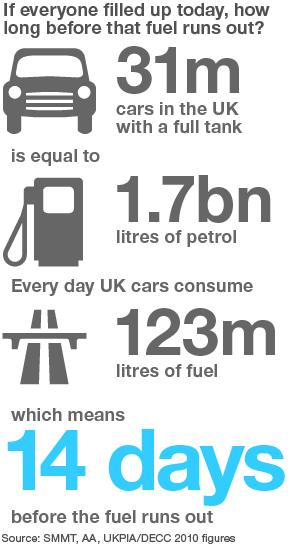Fuel strike over Easter ruled out by union
- Published
An Easter strike by fuel tanker drivers has been ruled out by the Unite union.
It is to join conciliation talks but said a strike could be called for after Easter if those broke down.
The government welcomed the announcement but said Unite should withdraw the threat of a strike. Fuel sales have risen sharply this week after government warnings to motorists.
In York, a woman suffered 40% burns on Thursday when petrol ignited as she was decanting it in her kitchen.
The union announced on Friday morning that there would be no strike over Easter.
In a statement, assistant general secretary Diana Holland said: "We do still retain the right to call strike action for after Easter should those talks break down."
A Downing Street spokesman responded: "Its obviously good news that people are not going to have their bank holiday ruined. But it's time Unite withdraw their totally unacceptable strike threat."
Prime Minister David Cameron is currently chairing a meeting of Cobra, the government's civil contingencies committee.
Some 90% of UK forecourts are supplied by the Unite union's 2,000 or so members at the centre of the dispute.
Unite's drivers, who deliver fuel to Shell and Esso garages and supermarkets such as Tesco and Sainsbury's, have called for minimum working conditions covering pay, hours, holiday and redundancy.
Following the Unite announcement, conciliation service Acas said it would be meeting the employers involved in the dispute on Monday and that it hoped formal talks also involving the union could start as soon as possible after that.
'Pressure at the pumps'
RAC Foundation director Stephen Glaister said: "This news will be a great relief to all those who thought their holidays were going to be severely disrupted.
"It should give everyone breathing space and ease the pressure at the pumps."
Queues formed at many petrol stations across the country on Thursday as demand for fuel rose.
Some garages ran dry but retailers said they were coping and normal deliveries would ensure supplies were replenished.
Anticipating a strike they describe as "completely wrong", ministers have called for motorists to keep their cars "topped up" but urged people not to queue.
On Thursday, Energy Secretary Ed Davey advised that people "just need to do the sensible thing... get a full tank of petrol, not a half-tank".
Demand for petrol rose 172% on Thursday, and diesel by 77%, according to independent retailers' group RMI Petrol.

RMI Petrol chairman Brian Madderson accused ministers of "making a crisis out of a serious concern" and said they should have sought industry advice "weeks ago" on how to avoid fuel shortages.
The Petrol Retailers Association, which represents about 5,500 garages, said: "This is exactly what we didn't want - people panic-buying."
But Conservative Party co-chairman Baroness Warsi defended the government over its advice in the face of a possible strike.
"I want a government that's prepared to say to people 'use your common sense and let's be resilient and make sure there's fuel built into the system'.
"I don't want a government that's sat on its hands, waits for the crisis to approach us and then looks like it's caught in the headlights," she said.
The accident in York on Thursday happened as a woman in her 40s was transferring petrol between containers in her kitchen because her daughter had run out of fuel.
The cooker was on and the petrol fumes ignited. The woman has been treated for her injuries at Pinderfields Hospital in Wakefield.
The day before had seen controversy over Cabinet Minister Francis Maude's suggestion that people could store petrol in jerrycans at home - advice later withdrawn as a mistake.
'Shambles' accusation
Labour leader Ed Miliband has called on the prime minister to apologise for "presiding over a shambles on petrol" and accused the government of diverting attention from criticism of the Budget.
The Conservatives hit back at Labour for failing to condemn the stance of Unite - the party's biggest donor.
Mr Davey met hauliers on Friday to discuss plans in the event of a strike, telling the BBC that the talks were aimed at building "detailed and robust" contingency plans.
One of the issues discussed at the meeting was ways to store fuel to ensure that emergency services had enough supplies in the event of industrial action.
A Department of Energy and Climate Change spokeswoman said the meeting was "productive" and focused on contingency planning, as well as covering the training of more military drivers should a strike be called.
- Published30 March 2012
- Published29 March 2012
- Published29 March 2012
- Published29 March 2012
- Published29 March 2012
- Published13 April 2012
- Published29 March 2012
- Published29 March 2012
- Published26 March 2012
- Published25 March 2012